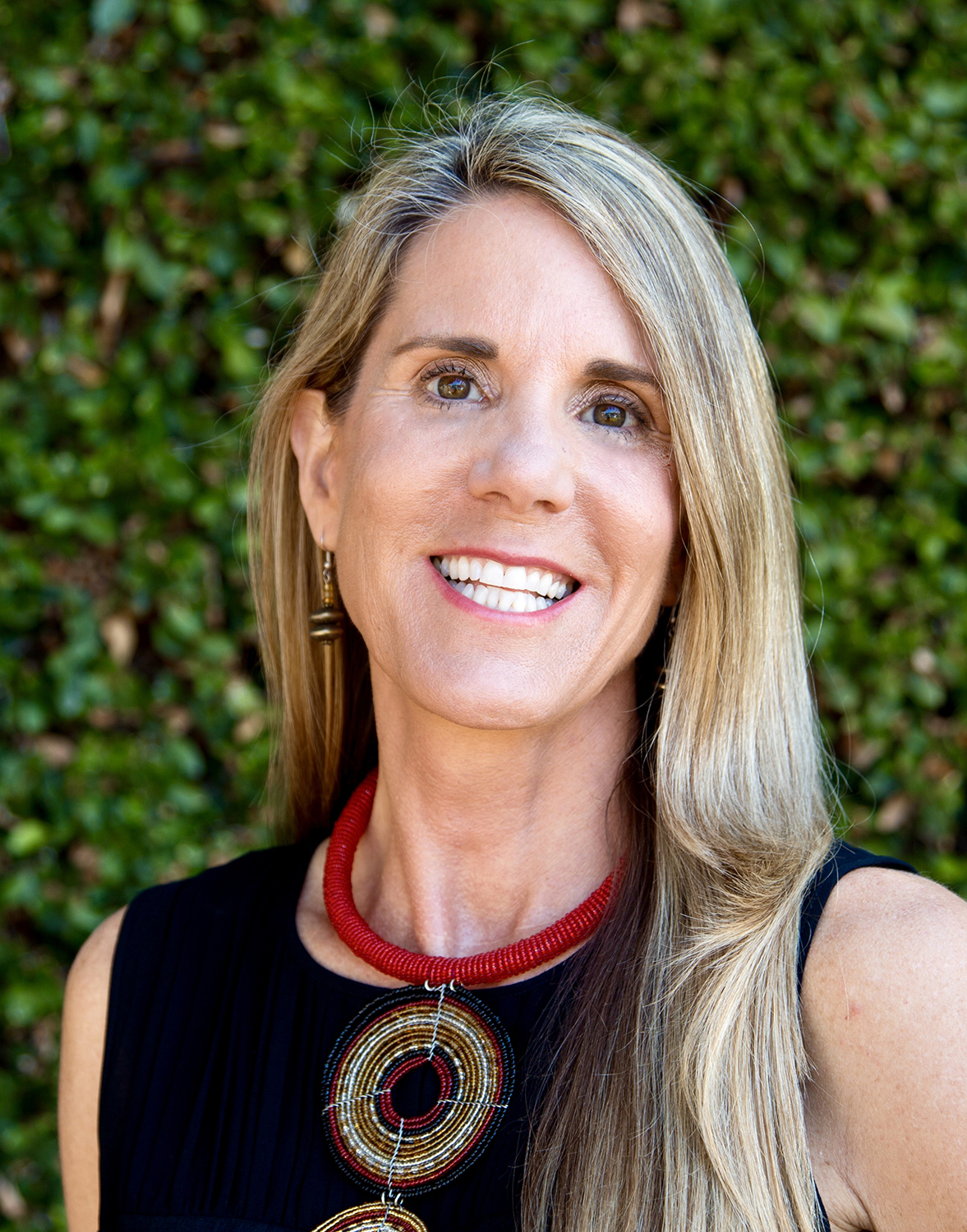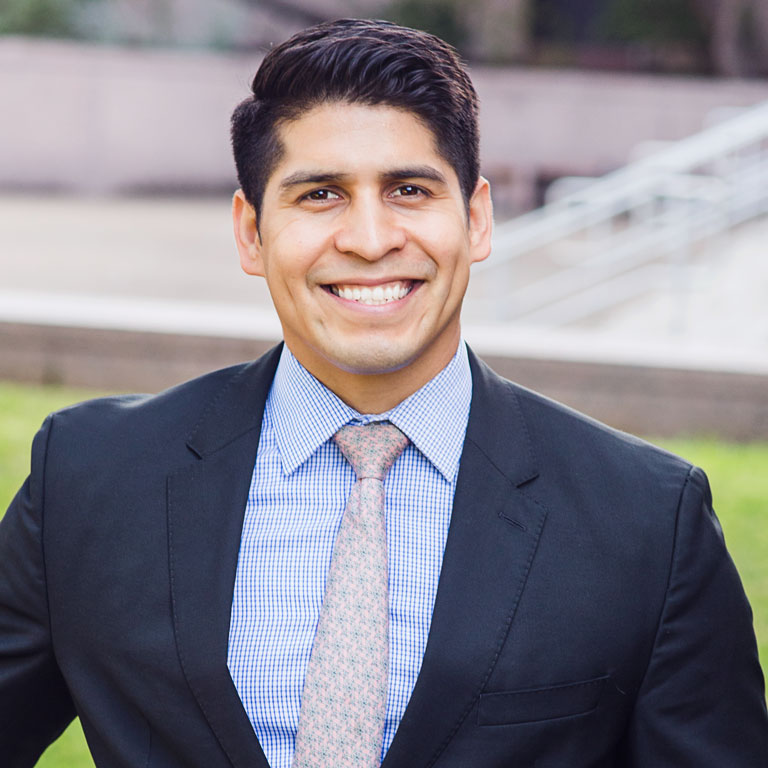Stanford alumni Dianne Calvi, Rey Saldaña honored with 2023 President’s Award for the Advancement of the Common Good
Dianne Calvi and Rey Saldaña are honored with the 2023 President’s Award for the Advancement of the Common Good, which celebrates the work of alumni making a positive impact on communities.
Whether addressing extreme poverty in Africa or supporting generations of youth at schools nationwide, Stanford alumni are positively changing the trajectory of people’s lives in their communities and around the world.
In honor of their work, Stanford alumni Dianne Calvi, BA ’84, and Rey Saldaña, BA ’09, MA ’10, will receive the 2023 President’s Award for the Advancement of the Common Good.
Calvi, president and CEO of Village Enterprise, advocates for the most vulnerable and works to end extreme poverty in rural Africa. Saldaña is president and CEO of Communities in Schools, the country’s largest nonprofit providing student support inside schools, ensuring students are empowered to stay in school and on a path to a brighter future.
The award recognizes individuals who exemplify the university’s mission and values, and demonstrate a commitment to learning, social responsibility, and ethical and effective service.
“Rey and Dianne embody the essence of this award. They are both dedicated to uplifting others and finding impactful solutions to the challenges facing communities,” said President Marc Tessier-Lavigne. “Their inspiring commitment to public service illustrates our hope for Stanford graduates – that they will go on to pursue lives of purpose and civic engagement. I look forward to bestowing this well-deserved recognition at Commencement.”
Dianne Calvi
Growing up, Calvi was inspired by her father, who grew up in poverty and picked cherries as a migrant worker during the summers before going on to earn his undergraduate degree, MBA, and PhD. When she was young, her mother got her involved in volunteer work, which exposed her to societal inequities.
“I was so fortunate to be born into a family that loved and supported me and could provide me with all of the opportunities one needs to be successful in life,” Calvi said. “But I also knew that not everyone had those same opportunities.”
While studying political science at Stanford, Calvi took courses in economics, political science, and history that made her more aware of the role that governments and policies play in perpetuating or correcting inequities in the world.
As a junior, she studied at Stanford’s program in Florence, Italy, where she became interested in different worldviews, particularly in regard to social welfare and the societal roles of government and corporations. Calvi returned to Italy to complete her MBA in Italian at Bocconi University in Milan on a Rotary Ambassadorial Scholarship.
“It forced me to continue to reexamine my values and ways of thinking,” she said. “I realized it was possible to change policies so that systems would be more equitable.”
Calvi went on to hold leadership positions at nongovernmental organizations and technology companies. She also served on several nonprofit boards.
“Stanford is providing the education that people need to go out into the world and make a difference,” Calvi said. “Poverty is a complex problem, so you’re not going to address the problem with just one solution or policy. It’s going to be a collection of policies and the collective action of many actors over time.”
In 2010, Calvi joined Village Enterprise, which seeks to end extreme poverty through entrepreneurship, innovation, and collective action.
“Poverty is a problem that can be overcome and eradicated if people are equipped with resources and skills and the right policies and equitable systems are put in place,” Calvi said.
Village Enterprise equips Africans living in extreme poverty with cash transfers, training, and mentoring to create income-generating, sustainable businesses and savings groups.
Calvi has grown the organization’s impact by focusing on strategic partnerships; innovation and technology; rigorous monitoring and evaluation; and building a passionate African team. Village Enterprise has also completed two independent randomized control trials that demonstrate Village Enterprise’s significant impact on poverty alleviation, and governments are now in the process of incorporating its model, Calvi said.
Under her leadership, Village Enterprise has helped lift over 1 million Africans out of extreme poverty and has been recognized for its Village Enterprise Development Impact Bond, the first development impact bond and outcome fund for poverty alleviation in Africa. And just last month, Village Enterprise and Mercy Corps’ DREAMS for Refugees poverty alleviation model won Fast Company’s 2023 World Changing Ideas Award for the Europe, Middle East, and Africa region.
“In my 25 years of serving on nonprofit boards, I have never worked with a leader with Dianne’s unique blend of authenticity, humility, integrity, passion, and ‘ubuntu’ – an African belief that ‘I am because of who we all are together,’” a nominator wrote.
Calvi was surprised and humbled to be recognized with the award from Stanford.
“Stanford has played a huge role in the way I think about the world, exposing me to new ways of thinking and different philosophies,” she said. “This award is a reflection of a bigger community and work that Village Enterprise is doing to end extreme poverty. I am sharing this award with all of these people who have contributed to the work of Village Enterprise.”
Rey Saldaña
When Rey Saldaña was in high school, he and his classmates fought to get a bookstore on the southside of San Antonio, Texas.
The experience proved pivotal for Saldaña, a son of immigrants from Mexico and the first in his family to graduate from college.
“Organizing with local nonprofits and elected officials gave me a sense of what it feels like to have real power and to use that power to affect some significant change,” he said. “That stayed with me for a long time, and I think that’s what began this journey.”
Growing up, Saldaña warmly recalls years of support from Gladys Reyes, a site coordinator placed in his school by the national nonprofit Communities in Schools (CIS). Years later, Saldaña became a leader at CIS, first as a member of its board of directors in 2017 and then as its president and CEO in 2020.
CIS places site coordinators in schools to establish systems that provide services to both the whole school and individual students by facilitating support to address issues such as food insecurity, unstable housing, lack of access to health resources, and more.
“The simple idea is that we believe that a caring adult has a huge impact in the life trajectory and the access to opportunity for the student, especially those students who are Black, Brown, or living in low-income communities impacted by the effects of poverty,” Saldaña said.
While at Stanford, Saldaña met graduates whose lives in public service inspired him to return home to San Antonio to help others. Saldaña received his bachelor’s degree in political science and communication, and the following year, he received his master’s at the Graduate School of Education in policy, organization, and leadership studies.
As a graduate student, Saldaña began to understand how his experience at Stanford and feelings of inadequacy stemmed from his own K-12 education. As a result, he started asking what policy levers contributed to that experience. After graduating, Saldaña returned to San Antonio and began teaching at local colleges and universities.
Then, with the support of Stanford classmate Matthew Platkin – now New Jersey attorney general – as his campaign manager, he successfully ran for a seat on the San Antonio City Council. At 24, he was the youngest city council member in the city’s history, and he went on to serve four terms.
“We all saw the genuine love he had for his community and the hours of walking the neighborhood, knocking on doors, and hearing residents’ concerns he did each day, for months,” said one nominator.
At CIS, Saldaña now leads the country’s largest provider of student support inside schools with more than 4,000 staff embedded in over 3,000 Title I schools in 26 states.
“At Stanford, we think about scale in such a significant way where you can’t be satisfied with small successes and small impacts,” Saldaña said. “What Stanford does is it expands your appetite for how you can do a small amount of good in a big way.”
Saldaña said the news of the award was affirming for him. “Like many Stanford students and, more acutely, first-generation college students, I suffered from a very heavy dose of imposter syndrome,” he explained.
And while his background initially contributed to his feelings of inadequacy, Saldaña now sees it as a strength.
“I have found so much love in following the journey of where I’m from, because it has given me a path to do the things that I want to do at a large scale,” Saldaña said. “We’re working in schools like my high school, and I wake up every single day excited and challenged by what I’m getting to do. This is public service.”
Before CIS, Saldaña also worked with the University of Texas at San Antonio’s Office of Community Engagement, as chief engagement officer with KIPP San Antonio Public Schools, regional advocacy director for the Raise Your Hand Texas Foundation, and chair of the San Antonio Metropolitan Transit Agency-VIA.
The Office of the President partnered with the Haas Center for Public Service and the Stanford Alumni Association to create the award in 2021. Stanford invites the university community to nominate living alumni, from recent graduates to those with established careers in public service.
A committee of alumni, faculty, and staff reached a strong consensus for each of this year’s award winners.
The award joins other university awards conferred during Commencement honoring faculty, students, and staff, including the Kenneth M. Cuthbertson Award for Exceptional Service to Stanford University, the Lloyd W. Dinkelspiel Awards for Outstanding Service to Undergraduate Education, and the Walter J. Gores Awards for Excellence in Teaching.
Award information, including the nomination form, is available on the Haas Center website. The nomination period for the 2024 President’s Award is now open.

